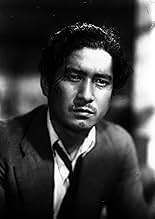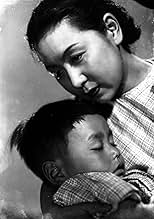Kaze no naka no mendori
- 1948
- 1 घं 24 मि
IMDb रेटिंग
7.4/10
2 हज़ार
आपकी रेटिंग
अपनी भाषा में प्लॉट जोड़ेंA man returns from World War II to find his desperate wife had resorted to one night of prostitution to pay for their son's hospital bills.A man returns from World War II to find his desperate wife had resorted to one night of prostitution to pay for their son's hospital bills.A man returns from World War II to find his desperate wife had resorted to one night of prostitution to pay for their son's hospital bills.
- पुरस्कार
- 2 जीत और कुल 1 नामांकन
फ़ीचर्ड समीक्षाएं
"Record of a Tenement Gentleman" is Ozu's actual first post-war movie, but while it is set in a post-war environment it still relied a lot in his themes of family, father/mother and son, family love that Ozu had always explored, rather than discussing questions from a post-war society.
"A Hen in the Wind" does that. It offers a true war/post-war situation and deals with the people that suffer from it.
The story is quite simple and I've found some of his other movies to be more emotional. However, it is one of his most serious and violent. I do think Ozu is capable of adding more depth to his movies than what we see here, but I was very happy to find a different subject from what he does usually, explored in a such disturbing way. Ozu's themes are pretty much the same all over his work, but "A Hen in the Wind" stands out for a different kind of serious issue. It is, for that, very refreshing.
Very serious, very sad, very human, unexpectedly violent and a touching look at a post-war situation, it stands out mostly for being different from Ozu's usual themes.
"A Hen in the Wind" does that. It offers a true war/post-war situation and deals with the people that suffer from it.
The story is quite simple and I've found some of his other movies to be more emotional. However, it is one of his most serious and violent. I do think Ozu is capable of adding more depth to his movies than what we see here, but I was very happy to find a different subject from what he does usually, explored in a such disturbing way. Ozu's themes are pretty much the same all over his work, but "A Hen in the Wind" stands out for a different kind of serious issue. It is, for that, very refreshing.
Very serious, very sad, very human, unexpectedly violent and a touching look at a post-war situation, it stands out mostly for being different from Ozu's usual themes.
It is not one of Yasujiro Ozu's best films. Both just after the war he made Record of a Tenement Gentleman (1947) and the Late Spring (1949) but this one comes between these two. The others are fine but not this one, it is not terrible but it is that, we know what is going to happen. The husband is away in the war and she is having to sell her clothes so she can feed her toddler. It gets more sad for her when he is unwell and naturally the hospital bills have to be paid. Even she knows what she will have to do and her friend mentions what she can do. We don't see her prostitute herself but we know and of course her husband is soon back home lazing around and has to find out how she had got the money. Raping her and throwing her down the stairs are because he is rather upset and that he felt unmanly. We can't really comprehend this couple, especially because of the war, but certainly in Japan we can just about understand how it is for them.
Ozu's first movie after the war is full of scenery that points towards a rapidly industrializing Japan. There are no remnants of what happened a handful of years ago. As a son of a single parent, I empathized with the film's protagonist. Yes, Ozu does make his character do the extreme because that makes for a far more engaging cinema.
A Hen in the Wind also manages to depict a real look at marriages and how much woes Japanese (and Southeast Asian) women were subject to. At that time, both capitalist and communist nations put out propaganda films to show their women as leaders. A Hen in the Wind.gives you an authentic peek at how much genuflecting women from these cultures had to perform in order to live a very ordinary life where poverty awaits them at every corner. The Italian film, Bicycle Thieves (released around the same time) makes a great companion piece to A Hen in the Wind. If you've loved one, you'll love the other.
A Hen in the Wind also manages to depict a real look at marriages and how much woes Japanese (and Southeast Asian) women were subject to. At that time, both capitalist and communist nations put out propaganda films to show their women as leaders. A Hen in the Wind.gives you an authentic peek at how much genuflecting women from these cultures had to perform in order to live a very ordinary life where poverty awaits them at every corner. The Italian film, Bicycle Thieves (released around the same time) makes a great companion piece to A Hen in the Wind. If you've loved one, you'll love the other.
In postwar Japan, a wife has to deal with the consequence of her decision when she needed her son's hospital charges during her husband's absence. The theme, women's harsh reality at the time, is exceptionally serious for Ozu. It makes Hen in the Wind uniquely and intensely emotional, combined with Ozu's style, such as off-screen actions, implicative montages, and singsong dialogues.
Kaze no Naka no Mendori deals with a very serious social problem of the time -- the return of those away at war. Frequently supposed dead and often delayed by years after the war's end, returning soldiers came back to families that had had to make all manner of compromises and sacrifices related to their absence. Often the returnees found that their wives had re-married, or worse...
This is one such story. Unusual for Ozu in that it depicts actual physical family violence. A bit shocking if you are used to his other films, in which disapproval is often expressed with raised eyebrows and silence.
A good film with fine performances.
This is one such story. Unusual for Ozu in that it depicts actual physical family violence. A bit shocking if you are used to his other films, in which disapproval is often expressed with raised eyebrows and silence.
A good film with fine performances.
क्या आपको पता है
- ट्रिवियाFrench visa # 159347.
- भाव
Tokiko Amamiya: I'm willing to give mu soul if it means raising my son.
- कनेक्शनReferenced in Ikite wa mita keredo - Ozu Yasujirô den (1983)
- साउंडट्रैकYume awaki Tôkyô
Music by Yûji Koseki
टॉप पसंद
रेटिंग देने के लिए साइन-इन करें और वैयक्तिकृत सुझावों के लिए वॉचलिस्ट करें
- How long is A Hen in the Wind?Alexa द्वारा संचालित
विवरण
- रिलीज़ की तारीख़
- कंट्री ऑफ़ ओरिजिन
- भाषा
- इस रूप में भी जाना जाता है
- A Hen in the Wind
- उत्पादन कंपनी
- IMDbPro पर और कंपनी क्रेडिट देखें
- चलने की अवधि1 घंटा 24 मिनट
- रंग
- ध्वनि मिश्रण
- पक्ष अनुपात
- 1.37 : 1
इस पेज में योगदान दें
किसी बदलाव का सुझाव दें या अनुपलब्ध कॉन्टेंट जोड़ें

टॉप गैप
By what name was Kaze no naka no mendori (1948) officially released in Canada in English?
जवाब
























